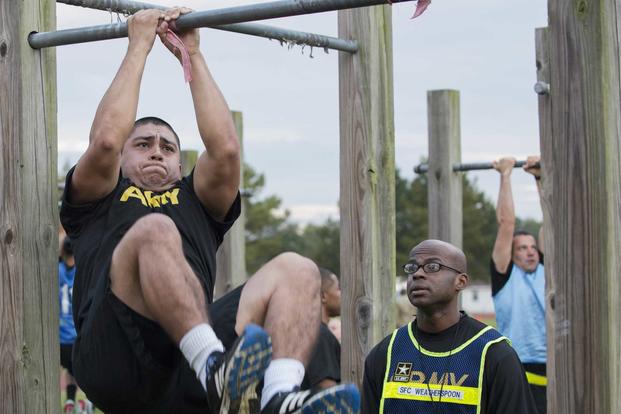
Two senators are asking other lawmakers on Capitol Hill to support a push to pause implementation of the new Army Combat Fitness Test, which they say sets unrealistic standards for some soldiers.
Democratic Sens. Kirsten Gillibrand and Richard Blumenthal wrote a letter to House and Senate Armed Services Committee leaders Tuesday, asking them to keep a measure in the 2021 National Defense Authorization Act that would halt the rollout of the long-awaited ACFT. Military.com obtained a copy of the letter, which was first reported on by The Washington Post.
Gillibrand, of New York, and Blumenthal, of Connecticut, say an independent study is needed to examine whether the test is fair to both men and women. They also say the ACFT lowers standards for young male soldiers while setting unrealistic requirements for those serving in fields with few physical demands, such as medical personnel, judge advocates or cyber warriors.
Read Next: Marine 2-Star Under Investigation for Racial Slur Has Been Relieved of Command
“Since the Department of the Army has initiated the new Army Combat Fitness Test (ACFT), significant concerns have been raised regarding the data used to develop the test, initial test scores, and logistical issues,” the letter states. “The ACFT will determine the career path and success of all soldiers currently serving, yet many information gaps and unknowns remain.”
Army officials did not respond to questions about the letter. Units were authorized to begin taking the ACFT on Oct. 1 after the test was delayed due to the novel coronavirus pandemic.
The scores soldiers receive on the new test won’t count until 2022, however, and will be for data collection only.
Still, Gillibrand and Blumenthal say the ACFT rollout is “premature.” They point to gender and age gaps in the Baseline Soldier Physical Readiness Requirements Study, which the Army conducted to identify fitness requirements that best measure demands of combat.
“The average participant was 24 years old and male,” the letter states. “During Phase II, only 14.3% of test participants were female, and in Phase III, only 10.5% of participants were female. This is not even representative of the total Army force.”
And while the study determined the leg tuck is not a “significant predictive variable,” the letter adds, it was still chosen to be one of the ACFT’s six events. The leg tuck leads to the most test failures, they wrote, yet the Army “has failed to show [it] has any nexus to the skills necessary for combat.”
“It is imperative that we pause implementation until all questions and concerns are answered,” the senators said. “Soldiers’ careers depend on it and the continued lethality of our force requires it.”
Last year, slides leaked on social media showing female soldiers were failing the ACFT at much higher rates than men. About a third of male soldiers were failing the test at the time, while 84% of women were failing.
Maj. Gen. Lonnie Hibbard, commander of the Center for Initial Military Training, told Military.com shortly after the leak that the Army was seeing about a 100-point difference between male and female ACFT scores. The test includes six events: a deadlift, standing-power throw, hand-release push-ups, a sprint-drag-carry, the leg tuck and a 2-mile run.
It’s the service’s first-ever gender-neutral fitness assessment, and Hibbard said at the time that it might take up to five years for scoring gaps between men and women to even up.
The Washington Post reported that women are still failing the test “at dramatically higher rates than men.”
“In the second quarter of 2020, 54 percent of women failed the test, compared with 7 percent of men,” the Post reported, citing Army data.
Gillibrand and Blumenthal say they understand the need for the Army to develop gender-neutral fitness requirements after all military jobs opened to women, but the ACFT “has missed the mark.”
Their proposed measure in the Senate version of the NDAA calling for a pause to the ACFT would require a new independent study of the test. That would include a look at how operating in climates where outdoor training is tough might adversely affect some soldiers, and how the ACFT will affect recruiting and retention.
There is no similar proposal in the House version of the defense policy bill, but congressional leaders are set to meet to reconcile the two versions after next month’s election, according to the Post.
“This test runs counter to the Army’s new talent strategy that aims to create a 21st century talent management system with policies, programs, and processes that recognize and capitalize upon the unique knowledge, skills, and behaviors possessed by certain individuals,” the senators’ letter states.
“We acknowledge that the ACFT 2.0 is a work in progress,” it adds, “but we have considerable concerns regarding the negative impact it may already be having on so many careers.”
Source: Military News



